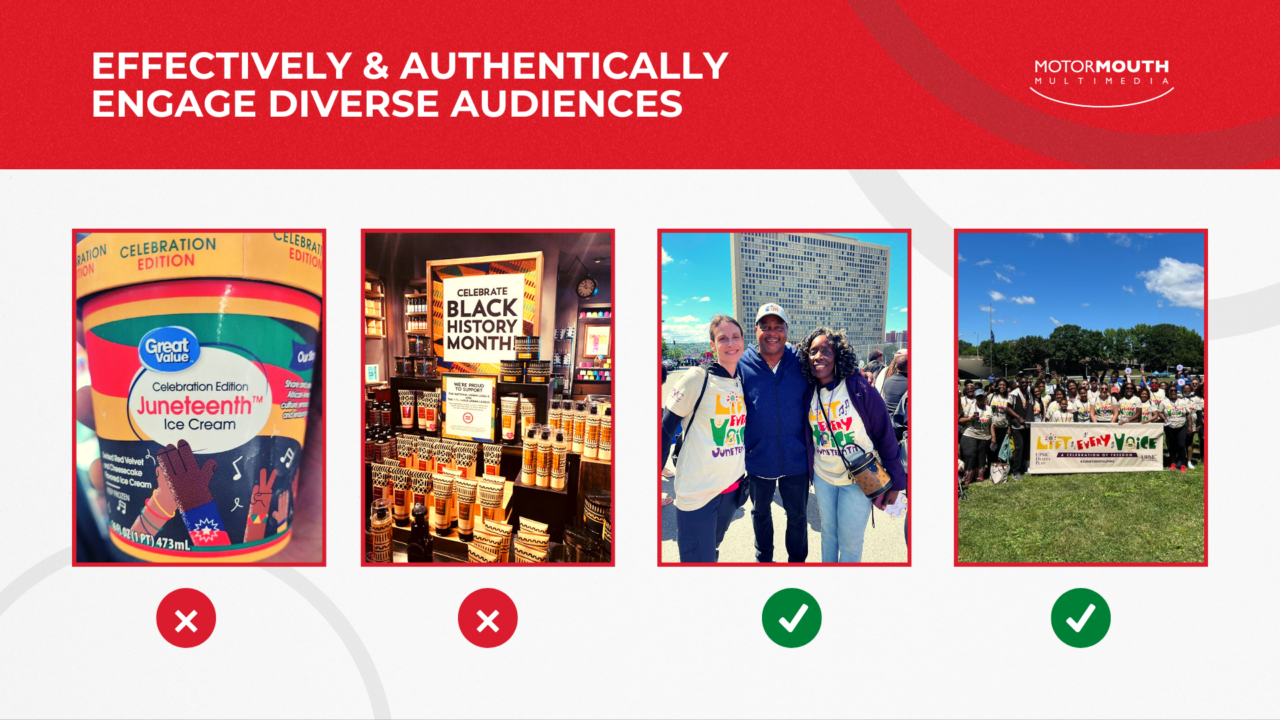Disclosure: This article addresses how companies can authentically engage with the Black community. We realize that each member of this demographic is unique, and a one size fits all approach won’t reach everyone. Building trustworthy relationships while building your brand is the key to unlocking this market.
For decades, Black people have been left out of the marketing strategies of countless companies. They weren’t recruited to focus groups, cast in commercials, or even surveyed about products and services. Despite often being ignored, under appreciated, and uninvited, the Black community continued to pour their money into the U.S. economy. Recent research shows that the combined spending by Black households is outpacing the growth rate of the combined spending of white households.
There is now a $300 billion opportunity in serving the Black consumer market. From television and social media to music and fashion, Black culture significantly influences society. Some brands are beginning to recognize how crucial it is to attract this demographic beyond one-off campaigns for Black History Month or Juneteenth.
Recently, Motor Mouth Multimedia designed UPMC’s, a Pittsburgh-based healthcare prover and insurer, promotional products for the city’s Juneteenth Celebration. The company brought a Brooklyn marching band to town, so we created a campaign with a musical theme. We designed shirts, banners, and medallion beads with Lift Every Voice, which is the Black National Anthem. They also requested noisemakers, so we customized tambourines. The musical instrument is a staple Black church. This campaign is an example of how you can increase cultural awareness and embrace employees’ identities. Without a diverse team, this campaign could harm and not support the Black community, which is what occurred with Walmart. Walmart’s attempt to commemorate Juneteenth by producing a Walmart brand ice cream didn’t go over so well and led to a costly recall and public apology. Walmart failed to acknowledge Black-owned ice cream brands, as Target did, and the cartoon featured a generic Pan-African design, which generalizes the Black experience and the holiday which is meant to signify the belonging of Black Americans in the fabric of the U.S. Walmart went with generic African colors and designs.

Perhaps the thought of expanding your target audience intimidates you. Or, maybe you worry about offending someone when attempting to resonate with them. For a more effective marketing strategy, ask yourself the following questions: How can my team and I have a better, unbiased understanding of this customer base? What solutions does my brand offer to the issues faced by this audience? What steps do I need to take within my business to show support and solidarity to the Black community? What strategies can I develop to embed diversity, equity, and inclusion in my next campaign? Is DEI a part of my company’s overarching strategic plan?
To reach Black consumers, brands must design and execute ongoing outreach strategies–both internally and externally. The following steps will point you in the right direction.
EQUALLY PRIORITIZE SPENDING AND EXPERIENCES
Black consumers’ buying power is the highest among most demographics and is set to reach 1.7 Trillion dollars by 2030. In fact, Black shoppers are willing to pay up to 20% more for the right products that meet their needs.
It’s critical to prioritize not only coins but also culture. Marketing missteps occur when advertisements feature racial stereotypes instead of authentic experiences. Remember these experiences aren’t just Black and White. Black people have different religions, sexual orientations, genders, disabilities, interests, and more. You must show genuine interest in more than just their purchasing power. You must care about what led them to make the purchase.
LISTEN TO CONSUMERS AND EMPLOYEES
Marketing effectively to Black audiences is no longer an option, it’s a necessity. The voices of Black consumers are stronger than ever thanks to technology, the growth of Black Twitter, and the rise of influencers, all demanding action behind brands’ commitments. Black consumers are now speaking directly to brands about their needs. They are urging brands to become allies for racial justice and to market to Black people more inclusively and thoughtfully. Generic, tone-deaf marketing strategies won’t deliver results. Missing the mark can lead to being canceled by consumers.
Some companies are even amplifying Black voices and experiences on their platforms. This allows Black creators to share their stories with wider audiences and create mutually beneficial relationships.
Your brand’s marketing team should not only listen to Black consumers but also value the perspectives of Black employees and Black affinity groups. A poll conducted in 2020 by Morning Consult revealed that 32% of Black consumers don’t believe they’re represented “much” or “at all” in marketing materials, while 46% said they only see people like themselves represented some of the time. It’s important that Black people are in the room when advertising decisions are being made. With diversity comes multiple perspectives and a variety of backgrounds and experiences. This will establish a stronger connection and a greater sense of belonging for everyone–your employees and customers.
There are also cultural nuances. Words, phrases, and beliefs can often mean different things to different people. To earn trust and gain loyalty with Black consumers, it’s important to ensure that the marketing messages resonate with them and adequately reflect their realities and lifestyles.
AVOID CULTURAL APPROPRIATION
The Black millennial generation is tech-savvy and pays attention to how brands perceive their culture. They aren’t falling for gimmicks anymore or giving brands a pass for their insensitive attempts at inclusion. Stealing or capitalizing on the culture of a minority group can lead to serious backlash. Your brand must understand the damaging consequences of cultural appropriation. You should test and measure your ads with the audiences you are trying to reach to determine their validity and effectiveness. Dig deeper to understand the history of Black people before developing a product or creating marketing materials. There’s nothing wrong with incorporating traditions, practices, and cultural creativity into your marketing. But do so with honor, understanding, and ethics. Instead of stealing, asks permission, credit the creator, and offer compensation. Otherwise, your integrity will be questioned. Ensure that your marketing and business objectives strive to appreciate not appropriate Black culture. If not, with one social post, your brand could be next in line to face the inescapable, cancel culture mob.
Trust and respect are earned by brands that speak and understand their customers’ language. Your brand has a great opportunity to redefine its brand promise and deliver diverse and inclusive solutions that genuinely reflect and serve its audiences. Let Motor Mouth MultiMedia provide customized solutions for your brand to effectively engage with Black consumers.
